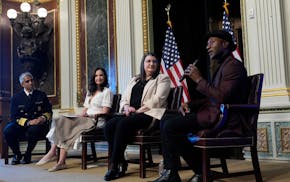It was "the whack heard 'round the world," according to the tabloids.
Nancy Kerrigan, one of the country's leading figure skaters, was exiting a practice session at the U.S. Figure Skating Championships in 1994 when she was bludgeoned in the right leg by an assailant.
Was rival skater Tonya Harding behind the attack? Did Harding somehow know about the plot (orchestrated by her ex-husband) to cripple her prospective teammate ahead of the 1994 Winter Olympics? These questions were never fully answered. And Harding remained a media punchline for decades.
Until now, perhaps. The disgraced former skater is back in the spotlight, thanks to the critically acclaimed new biopic "I, Tonya." The movie has inspired a fresh round of TV documentaries and magazine think pieces, with most taking a fresh, more progressive look at Harding's troubled life. Harding suffered abuse by her mother and first husband. Financial troubles left her struggling to mesh with the upper-middle-class world of figure skating.
With the Pyeongchang 2018 Winter Olympics in full swing, Twin Cities company Mixed Precipitation thought this an ideal time to revive "Tonya and Nancy: The Opera," created in 2006 by composer Abigail Al-Doory Cross and writer Elizabeth Searle. Performances take place Wednesday at St. Paul's BlackStack Brewing and Saturday at Bryant-Lake Bowl in Minneapolis.
Soprano and former figure skater Leah Reddy stars as Kerrigan in the company's staging. Reddy took a break from rehearsals last week to share her thoughts about the opera and the 1994 scandal.
Q: Were you old enough in 1994 to be aware of the Nancy Kerrigan-Tonya Harding incident?
A: Yes. I was 15 when it happened. I skated from age 7, so I was really interested in skating, and I was glued to the Olympics that year. I was very sympathetic to Nancy, but I didn't think Tonya was involved. She had a very fresh face and spoke very quietly. I thought she was probably really just focused on her sport.
Q: Do you still think Tonya was innocent?
A: No, I don't. As I got older, I thought for sure she had something to do with it. How could she have not known, with her ex-husband and people around her trying to come up with a plan to get her into the Olympics?
But I think there's more understanding now of Tonya's abusive background and chaotic family life. The media didn't care about that at the time.
Q: Have you seen the movie "I, Tonya"?
A: Yes! I went into it expecting to be mildly entertained. I was blown away by the acting, especially Allison Janney as Tonya's abusive mother, and the CGI used to re-create Tonya's famous triple axel jump, which she first did in 1991 at the U.S. Championships.
Q: How did you first become aware of "Tonya and Nancy: The Opera"?
A: It was 2006, and my husband was a subscriber to ESPN the Magazine. There was a one- or two-page spread about these people doing this "Tonya and Nancy" opera. And my husband said, "Well, if you ever get the chance you should do this. Because you sing, you love skating — and you could be a pretty convincing Nancy." It was in the back of my mind from that point on.
Q: You play Nancy Kerrigan in the opera. Do you get clobbered on the knee at some point?
A: I do. But it's with a prop baton, not the real thing. I skate out. There's some percussion, a big crescendo. And I get whacked and fall over.
When I say "skate," we're actually in ballet shoes — we pretend to skate.
Q: So how does the Tonya and Nancy story actually play out in the opera?
A: There's a cast of six singers. Four of them play a variety of characters, like Tonya's ex-husband Jeff Gillooly, Nancy Kerrigan's mom, Tonya's mom and Shane Stant, the man with the baton. Then there's me and Meredith Cain-Nielsen, who plays Tonya.
Everything we sing is taken directly from media reports. We include the 1994 Olympics skate-off and the medal ceremony. Then we fast-forward a couple of years. Nancy has her baby. And Tonya has her boxing gloves on, because she became a boxer for a while afterward.
Q: What is the music like?
A: The accompaniment is piano and percussion. Nancy's is the only music in the opera that's kind of "pretty" in a conventional sense. There's a lot of polytonality in the piece — music in different keys happening at the same time. It's tangled and complicated music, to describe a tangled and complicated story.
It's also fun. I've sung the part twice before with Mixed Precipitation. There was a lot of laughter and vocal support from the audience for Tonya. I love it when the crowd gets a little rowdy.
Q: The librettist, Elizabeth Searle, has described the opera as "a microcosm of our crazy country." What do you think she means by that?
A: Americans really like a story where there's a good character and a villain, and they want it to play out just so. They want Nancy to win the gold, they want Tonya to go to jail.
I think a lot of our politics are like that — there's black and white, there's right and wrong. But I find there's a lot of gray area in life.
Q: Especially in Tonya Harding's life?
A: Yes. The #MeToo connection was going through my head the entire time I was watching "I, Tonya" — how drastically your life can be changed by abusive relationships, like Tonya had with her mother and husband.
Terry Blain is a freelance classical music critic for the Star Tribune. Reach him at artsblain@gmail.com.

A wild week in restaurants with 4 closings and an opening
The Rolling Stones set to play New Orleans Jazz Fest 2024, opening Thursday

